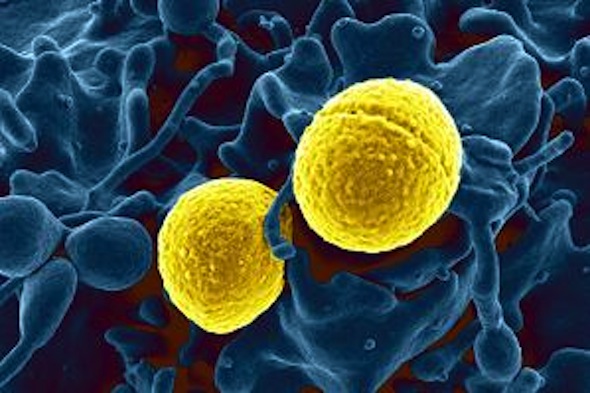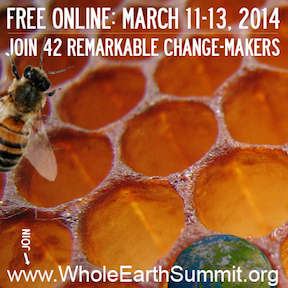
Saying No To Drugs is something alternative health practitioners have been practicing for years. The medical community has finally responded with advise to clinicians to try to reduce the use of antibiotics due to the emergence of antibiotic resistant bacteria like methicillin-resistant Staphylococcus aureus (MRSA). However, most of the antibiotic resistant bacteria have evolved from a different source entirely.
The Problem
The problem is emerging from soils and waterways polluted with traces of antibiotics and traces of bacteria encoded with antibiotic-resistant genes. These genes hold information that tells a microbe how to evade drugs designed to kill it. Apparently, bacteria are a lot smarter than we thought.
Even if that intelligent microbe isn’t capable of causing illness in humans, the DNA could find its way into the more malignant pathogens in the environment.
Scientists are finding out that the clinical realm is only part of the problem. At this point, clinicians are limiting unnecessary uses of antibiotics and encouraging patients to take the full course of their prescribed drugs (so that the most resistant are killed).
Water Treatment is not enough
It has been discovered that drug residues and bacteria with drug-resistant genes can pass together through the human and animal gut and into the environment, even if the living contaminants are first filtered through a wastewater treatment plant.
In a study published in the journal, Environmental Health Perspectives, May 2012, researchers Tello, et al, found that relatively low concentrations of antibiotics in certain environments — such as river sediments, swine feces lagoons and farmed soil — may be enough to speed along the proliferation of the drug-resistant genes.
Bacteria that can withstand the drugs will survive and reproduce, while the antibiotic-susceptible organisms die out. It is a simple survival of the fittest concept.
Resistant genes can be tranferred
Additionally, the resistant gene bacteria may be a benign species, but it can easily exchange genes with a more virulent species. The resistant bacteria can later be released to cause disease in an animal, plant or human.
Another study published in April 2012, by Lesley Warren et al, professor of Earth Sciences at McMaster University, found that floc, a goo-like substance that occurs suspended in water and that hosts large communities of bacteria – also contains high levels of antibiotic resistance.
This has important public health implications because the more antibiotic resistance there is, the less effective our antibiotic arsenal is against infectious diseases
said Warren, the principal investigator for the study that looked at floc in different freshwater systems.
They examined floc collected from Hamilton Harbour, which is impacted by sewer overflow; Sunnyside Beach in Toronto, which is impacted by wastewater; a rural stream near Guelph, impacted by light agricultural activities; and a remote lake in a natural preserve area in Algonquin Park, accessible only by float plane.
Researchers analyzed the water and floc samples for trace element concentrations and the presence of 54 antibiotic resistant genes.
They discovered that genes encoding resistance to clinically relevant antibiotics were present in floc bacteria at all four sites.
What this tells us is that antibiotic resistance is widespread in aquatic environments ranging from heavily impacted urban sites to remote areas…Yet, it also demonstrates that areas with greater human impact are important reservoirs for clinically important antibiotic resistance.
Big Ag and factory farms contribute to the problem
Our corporate agricultural methods and factory farming methods have spawned a breeding ground of lurking antibiotic resistant bacteria that threatens us all. More than half of all the antibiotics made go into animal feed and the FDA is still allowing this practice.
Factory farming of animals creates huge mountains of waste products that are polluting the waterways. When this waste from unhealthy farmed animals is sprayed on agricultural plants it creates the health hazards we have already experienced with the contaminated spinach fields a few years ago.
The Solution
The solution is to make sure you are getting enough beneficial bacteria on a daily basis to keep your body healthy. These bacteria will protect you from the pathogens you may come in contact with whether you live on a farm, in a city, work in a hospital (where the most bacteria lurk) or in a school (another breeding ground).
The best way to reinoculate ourselves with beneficial bacteria is to eat cultured foods. Learn how to culture anything! From the most common yogurt to more esoteric brining of vegetables, salsa, chutneys and condiments — most foods can be fermented — their shelf live lengthened without chemical preservatives, and most importantly, the beneficial bacteria is created.
By eating cultured foods on a daily basis you are building up the colonies of good bacteria that do so much for us and you are protecting yourself from the pathogens created by our dangerous food supply.
Register for Get Cultured! How to Culture Anything
Jenny from Nourished Kitchen is offering a $50.00 off coupon code, in addition to the sale, that is good through May 22.
- Original price:
$197.00 - Sale price:
$147.00 - Price with coupon: $97.00 — less than $7.50 per class!
Use code SAUERKRAUT at check out for the $50.00 discount.
Act now! — If you order today you will also receive the e-book Get Cultured! Probiotic Recipes from Nourished Kitchen.
Click here to find out more about the class and to register
Join Jenny in a Webinar about this class!
Click here to Register for the Free Webinar for this class
The Webinar will be held Friday May 18 at 1:00 – 2:00 PM Eastern Standard Time
Join traditional foods and fermentation educator Jenny McGruther of NourishedKitchen.com for an in-depth webinar covering safe, effective and practical tips for fermentation. Participants will learn how to choose fermentation equipment for all budgets, how to ensure ferments are safe, how to minimize contamination from stray microbes, as well as learn how ferments can be integrated into daily meals.
The Webinar has limited spots so don’t wait to register for that. You will get a good idea about what the class is like from the webinar.
Register here for the Free Webinar.
If you do not have the time or desire to learn this art, we have a great supplier of fermented vegetables and juices here.
This post is shared at: Fresh Bites Friday, Freaky Friday, Country Homemade Hop, Friday Food, Fight Back Friday, Seasonal Celebration, Monday Mania, Homestead Barnhop, Real Food 101, Tasty Tuesday Naptime, Traditional Tuesday, Hearth & Soul Hop, Mommy Club, Healthy 2Day. Real Food Wednesday, Sustainable Ways, Whole Food Wednesday, Allergy Free Wednesday, Whole Foods Wednesday, Full Plate Thursday, Simple Lives Thursday
Photo Credit
The owner of this website is a participant in the Amazon Services LLC Associates Program, an affiliate advertising program designed to provide a means for sites to earn advertising fees by advertising and linking to Amazon properties including, but not limited to, amazon.com, endless.com, myhabit.com, smallparts.com, or amazonwireless.com. Disclaimer
Tropical Traditions Gold Label Virgin Coconut Oil

Tropical Traditions Gold Label Coconut Oil is a product I use every day.










{ 4 comments… read them below or add one }
well thats a bit scary
Why am I not surprised. Sigh. I suppose there will be no will power or motivation on the part of the powers that be to change how big ag does things. More fermentation coming up.
I do worry about the effect of factory farms on the environment. It’s bad for the animals, for us and for the environment. Thank you for sharing this post.
You are such an inspiring source of carefully researched information- just love your blog!! Thanks for sharing this with us on Seasonal Celebration Sunday. You’re on our fb page by the way Rebecca x
Rebecca x
{ 1 trackback }